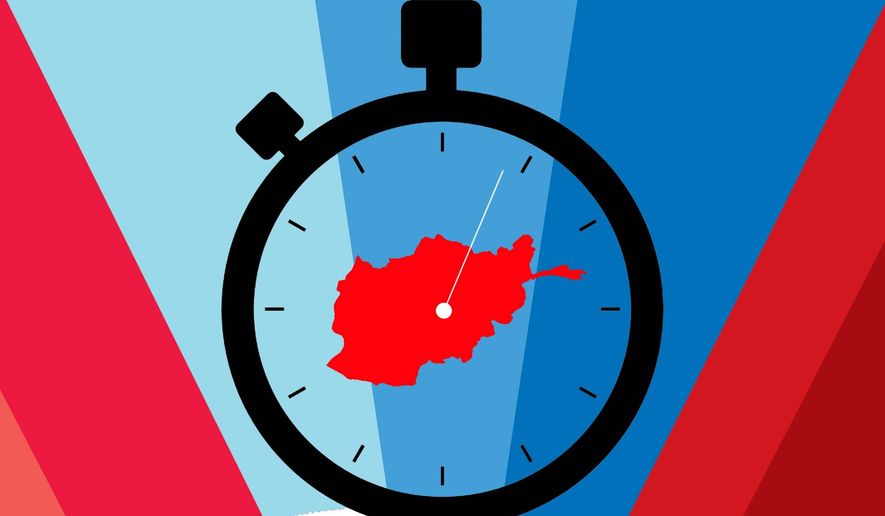OPINION:
Will Rogers famously said that “diplomacy is the art of saying nice doggie, until you can find a rock.” Regarding Afghanistan, President Biden needs to decide if he still wants to keep a rock in case the dog is rabid.
When the United States agreed to a nascent peace deal in Afghanistan a year ago, it was with the understanding that the Taliban would break relations with al Qaeda before we would withdraw the remainder of our troops. The Taliban have not held up their part of the bargain, and we should halt all further troop reductions until they fulfill their part of the agreement; it is as simple as that.
President Trump was wrong to consider a unilateral withdrawal without holding the Taliban to their agreed conditions, and President Biden would be wrong to continue the present withdrawal schedule. A congressionally sponsored advisory group led by retired Joint Chiefs Chairman Joe Dunford made that recommendation recently; and it is solid advice, but the president only has a short time to make the decision on stopping the proverbial last train out of Dodge.
The United States has made many mistakes in Afghanistan, but the commitment to not allowing that nation to again become a sanctuary for a sworn existential al Qaeda enemy had been one area of bipartisan agreement across the last three presidential administrations until late last year, when Mr. Trump decided to continue the troop withdrawals regardless of Taliban actions.
Few of us who watch Afghanistan seriously thought that the agreement would bring real peace to Afghanistan, but we did hope that a Taliban commitment to eliminate al Qaeda from the country would allow the U.S. and its allies to support both the Afghan government and the Taliban in eliminating ISIS which is a threat to both Afghan parties in the ongoing civil war.
The Dunford Group’s ultimate advice is sound, but its findings are much too sanguine about the possibility of regional neighbors — Russia, Pakistan, India and even Iran — being helpful in stabilizing Afghanistan.
Russia’s blundering in the region is what destabilized Afghanistan in the first place. The last thing Pakistan wants is a peaceful and strong Afghanistan. India is up to its elbows in disputes with China and Pakistan. And Iran is — well — Iran. If there is any lesson to be learned from 20 years in Afghanistan, it is that only the Afghans can resolve their own issues; that may take decades, but helping the country get rid of foreign influences such as al Qaeda and ISIS before we leave is still a positive role for the United States.
There are two truths that I have noted in these pages in the past that are worth reiterating here. First, we lose more Americans in traffic accidents every day than have died in Afghanistan in the last four years. We keep troops in Europe, Japan and Korea to discourage threats much less immediate than al Qaeda. Afghanistan remains a sound strategic investment against a very real terrorist threat to the homeland.
Second, we have built a working democracy — however imperfect — in Afghanistan. That democracy is supported by the majority of citizens, most of them in major urban areas. The Taliban hate this and will continue to try to gain control of the country. There are rural regions of the country where the conservative religious governmental approach taken by the Taliban is preferable to most of the population. It is likely that a one-country, two-systems approach will happen someday; quite frankly that is a long way off. The Afghans will eventually sort it out, but any solution should be resolved without the presence of foreigners, particularly ISIS and al Qaeda.
The smart thing to do in Afghanistan would be to craft a cease-fire agreement that would involve some sort of intelligence sharing and support to both the Taliban and the Afghan government in clearing the country of all international radical fighters while reserving the right to return in force if we detect a significant build-up of either ISIS or al Qaeda presence.
When we left South Vietnam in 1973, we did so with assurances from the North Vietnamese that they never intended to keep. Today, there is no South Vietnam. We still have leverage to curb the worst angels of the Taliban’s nature and help ensure that the Afghan people have some say in their own destiny while denying sanctuary to radical international Islamists. We owe that much to the thousands who have died in the war.
• Gary Anderson lectures on Alternative Analysis at the George Washington University’s Elliott School of International Affairs.




Please read our comment policy before commenting.